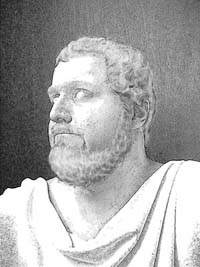 |
Introduction Site Map Main Project Email: jja@nac.net |

— Stanislaw Lem, Solaris


Thursday, April 28th, 2005
Update Thursday evening...
Update: Postponed until this weekend... Sorry.
 Update 2: In this entry, I will share some of the results of my research into the life of a
physician (iatros) of Ancient Greece, one Aronias of Histiaea. The image at left is of an 18th century
engraving of a marble bust of Aronias; the bust is now lost.
Update 2: In this entry, I will share some of the results of my research into the life of a
physician (iatros) of Ancient Greece, one Aronias of Histiaea. The image at left is of an 18th century
engraving of a marble bust of Aronias; the bust is now lost.
Aronias had the misfortune to live in interesting times, and at present little is known of his life. Histiaea suffered greatly under Athenian rule, and his loyalties in consequence appear to have been deeply divided (it is known that he fought in the Peloponnesian war, but it is not certain for whom, and some ambivalence towards the Persians is detectable in his more bitter fragments). It appears that Aronias dwelt in Athens for a time, and that he left only under force of ostracism; it is conjectured that many extra potsherds were added to the vote by followers of Athens's brightest thinkers, as Aronias was a level-headed man whose speech was plain and to the point.
The fragment below displays Aronias's writing style to good effect, and also reveals part of the reason for the esteem in which he was held among the philosophers of Athens:
It chanced once that Socrates the Know-Nothing came to me because his nose had been crushed by a stone-worker who had been fluting a column. I dressed his wound in good order, though with some difficulty as this was a common injury for him and the flesh in that area had become weak and scarred. I finished by inserting plugs into the nostrils to reshape them, and then requested my fee, whereupon he drew deep breath and launched into discourse.
O Aronias, he said, would you not say that the good is what just men do?
This seems to me to be true, I replied.
And that likewise, just men produce nothing but good?
Such is doubtless their intent.
And when the iatros heals the just, is this not a just action?
Of course it is.
But if the iatros were to heal the unjust, so that person would be enabled to cause others harm, might we say that this was an unjust action?
That might be said to be the case.
And when we pay our debts, are we not doing the just thing?
Indeed.
But if we pay our debts to the unjust, for unjust action, is this not an unjust thing?
None could deny it.
Now, were I to refuse to pay you your fee, would you say this to be an unjust action?
Most assuredly so!
And that, committing an unjust action, I was an unjust man?
Indeed!
Well, if such were the case, you would have done the unjust thing by healing me, for you would have healed an unjust man. In like manner, were I to pay your fee, I would be paying a debt to the unjust for an unjust action. Now, when seen in this way, does it not seem that for me to pay your fee would be unjust?
__________
When he had reached this point in his dialogue, I sensed that my fee was receding towards the clouds, so I took up a staff and belabored the feeble wretch, striking many blows on his belly and about the groin, though avoiding his head that I might not cause a crack in his rotted skull that would require excision. At length, the strength of my argument prevailed and I obtained my fee, and I also forced him to vow that he would hie himself to the asklepion and sacrifice a chicken, that he might show proper appreciation to practitioners of the healing arts. I myself vow that ere I treat another such lover of sophistry, I shall call upon a Lacedaemonian for aid, or entrust an Athenian with my money.



pageatatime.com is hosted by net access corporation - www.nac.net